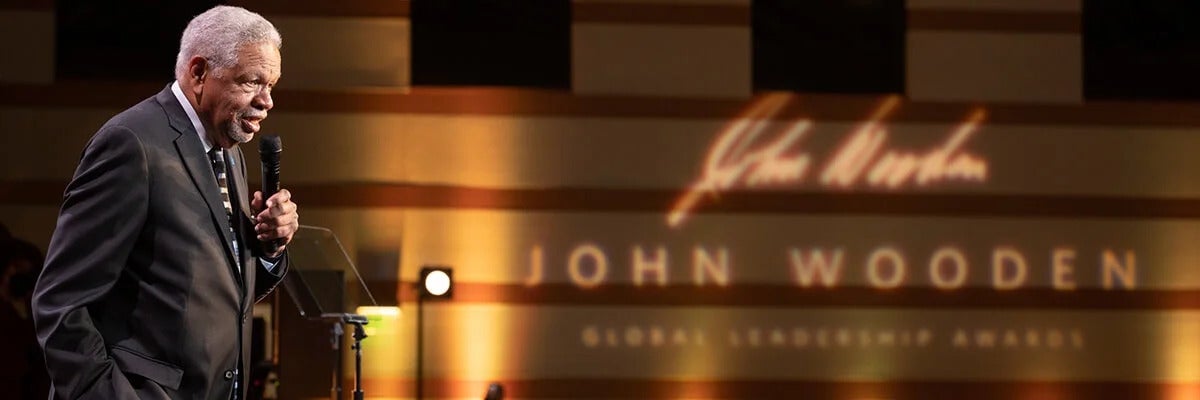When Senior Associate Dean Alfred E. Osborne, Jr., speaks of his philosophy on giving, it goes much deeper than “you can’t take it with you” (although he does subscribe to this adage). He also speaks of a charitable quotient (CQ), much in the way one might think of an EQ or IQ. In his words, “Our charitable quotient is a measure of our empathy for other human beings. It is demonstrated by promoting access and opportunity for others; building social capital by mentoring, connecting and sustaining relationships with others; discovering the power of one’s own philanthropy on behalf of others; and encouraging individuals to support others in these ways as well.” As Professor Osborne prepares for retirement this June, after five decades at Anderson — including terms as assistant dean, associate dean, senior associate dean and interim dean — his CQ will be one of his legacies.
One way that Osborne’s charitable quotient has manifested itself is through the creation of the Bradford-Osborne Research Award at the University of Washington, which was established to encourage and recognize groundbreaking research that advances scholarship regarding entrepreneurship and business ownership among underrepresented minorities. Another example is the generous contributions from former students that have led to the Alfred E. Osborne, Jr., MBA Fellowship, which provides access to higher education for African American students at UCLA Anderson.
“It’s amazing to think that 50 years from now, these awards and fellowships will continue to be offered. They will enhance learning and access for individuals whose ancestors had been systematically denied the opportunity to further themselves academically and professionally,” Osborne said. “The recipients of these awards will see that we, as people of color, have made progress in being educated; in being provided the opportunity to contribute, advance and learn; and therefore, will feel accepted for who they are as human beings in the complete sense of their hearts and minds. In essence, they will feel a sense of belonging.”
Improving access to education is only one piece of Osborne’s belief in a more just world. As an economist, he understands the role that wealth plays in society. He’s often wondered, “What can be done to improve access to capital and the distribution of wealth and income, particularly in underserved communities?” This question played a key role when former Dean Clay LaForce approached Osborne in the 1980s to launch entrepreneurial programming.
Along with essential partners Adjunct Professor Bill Cockrum, Associate Dean Elaine Hagan (’91) and a dedicated team of faculty and staff, Osborne has grown the Harold and Pauline Price Center for Entrepreneurship & Innovation while serving as its faculty director for the past 35 years. The Price Center’s commitment to business ownership includes opportunities for access to experiential learning, in addition to curriculum development and research. Osborne credits Harold Price with the concept of introducing real-world practitioners to the curriculum.
“Mr. Price shared the view that MBA students would benefit from interactions with entrepreneurs and business owners to complement their classroom learning,” said Osborne. “This idea led to the establishment of the Price Center, which we were able to build with support from the Price family, with whom we continue to have a tremendous relationship.”
Reflecting on his upcoming retirement, Osborne cherishes the countless relationships he’s formed with students, colleagues as well as longtime donors and partners such as the Price family and Johnson & Johnson. Nurturing and maintaining relationships are the final elements of Osborne’s charitable quotient.
“I think everybody is in a position to give back something, whether it’s time, talent or treasure,” Osborne said. “I’m a big believer in helping younger people when they have questions. I’ve come to appreciate the students who come back to say, ‘You said something that made a difference in my life, thank you.’ This commitment to giving back, mentoring, helping our students with their aspirations and trying to help them discover their path forward is an important part of developing a charitable quotient.”
You can honor Al Osborne’s legacy as he retires from UCLA Anderson with a gift to the Alfred E. Osborne, Jr., MBA Fellowship and/or the Price Center for Entrepreneurship & Innovation. Your gift in honor of Professor Osborne will be matched by a commitment of up to $3 million to the Price Center, thanks to a generous challenge grant made possible by the Louis and Harold Price Foundation.
For more information, contact Lauren Seebold, senior director of leadership and annual giving, at (310) 206-2449 or lauren.seebold@anderson.ucla.edu.
